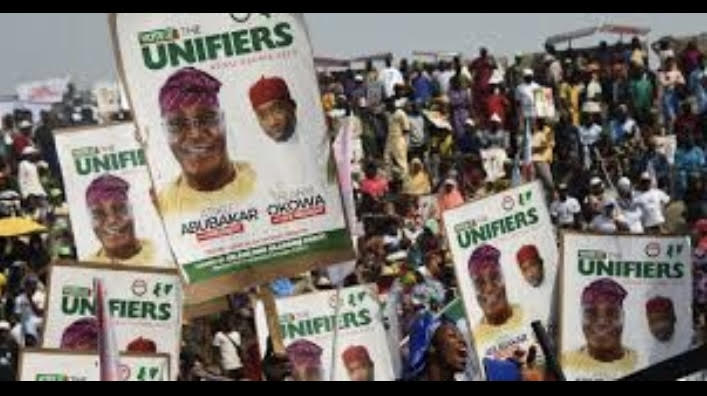Nigeria at the Crossroads: How Political, Religious and Cultural Divides Stall Our Development

Supporters of the opposition Peoples Democratic Party describe their presidential candidate and his running mate as unifiers because of their ethnic and religious mix. Pius Utomi Ekpei/AFP via Getty Images
By Dr. Michael Omoruyi, iNewsAfrica
Nigeria is a land of immense promise — a nation endowed with natural resources, vibrant youth, and cultural richness unmatched anywhere in Africa. Yet, more than six decades after independence, the country continues to stumble in its quest for true development. Why? The answer lies not only in corruption or poor policies but in the deeper fractures of political rivalry, religious divides, and cultural fragmentation that have been allowed to define our national story.
Politics of Division Over Progress
Our politics is less about vision and more about division. Elections are fought not on ideas but on ethnic and regional lines. Appointments are skewed to favor “our people” rather than the most competent hands. Institutions meant to safeguard democracy bend to political pressure, leaving ordinary Nigerians disillusioned. Instead of nation-building, politics has become a contest of ethnic arithmetic — Hausa-Fulani vs. Yoruba vs. Igbo — reducing leadership to a bargaining game rather than a unifying mission.
Religion as a Fault Line
Nigeria’s near-even split between Christianity and Islam, with indigenous faiths in the margins, has become a breeding ground for mistrust. In the North-East, Boko Haram and other extremist groups have turned faith into a weapon, leaving millions displaced and thousands dead. In politics, religion is shamelessly exploited to mobilize votes and sow division. The existence of parallel legal systems — Sharia in some northern states alongside secular law — further sharpens tensions. Faith, which should inspire unity and morality, has too often become an excuse for exclusion and suspicion.
Cultural Fragmentation: Strength Wasted
With over 250 ethnic groups, Nigeria should be the model of cultural pluralism. Instead, tribalism undermines nationalism. Resource control struggles in the Niger Delta highlight how cultural grievances are tied to economic injustice. Language divides reinforce barriers, leaving English — a colonial inheritance — as the only thread barely holding us together. Rather than harnessing diversity as a tool for innovation and creativity, we have allowed it to deepen mistrust.
The Development Cost
The result is plain: insecurity across regions, an economy stunted by instability, governance that prioritizes tribe and faith over the national interest, and a brain drain of disillusioned youth. Investors hesitate, policies falter, and citizens lose hope. A nation blessed with oil, gas, fertile lands, and human capital remains unable to feed its people, secure its borders, or inspire loyalty beyond tribal and religious lines.
The Way Forward
Nigeria must urgently reset. Inclusive governance must rise above tribal quotas. Civic education must build loyalty to Nigeria first, tribe and religion second. Dialogue and reconciliation are essential, not optional. Most importantly, restructuring toward true federalism can allow regions to develop at their own pace while contributing to the collective national vision.
Final Word
Diversity should be Nigeria’s greatest strength. Instead, political manipulation, religious fault lines, and cultural tribalism have turned it into our Achilles’ heel. To unlock our true potential, we must shift the narrative: from division to unity, from suspicion to trust, and from ethnic politics to national progress.
Only then can Nigeria fulfill its destiny as the giant of Africa — not just in name, but in reality.
About the Author
Dr. Michael O. Omoruyi is a technologist, educator, author, and founder of iNewsAfrica. He has spent over two decades bridging technology, culture, and advocacy, with a passion for giving voice to Africa’s narratives both at home and across the diaspora.
His forthcoming memoir, From Grit to Grace: A Memoir of Roots, Resilience, and Reinvention, will be launched on October 21, 2025 across Amazon and major bookstores worldwide.

Coming soon on Amazon











